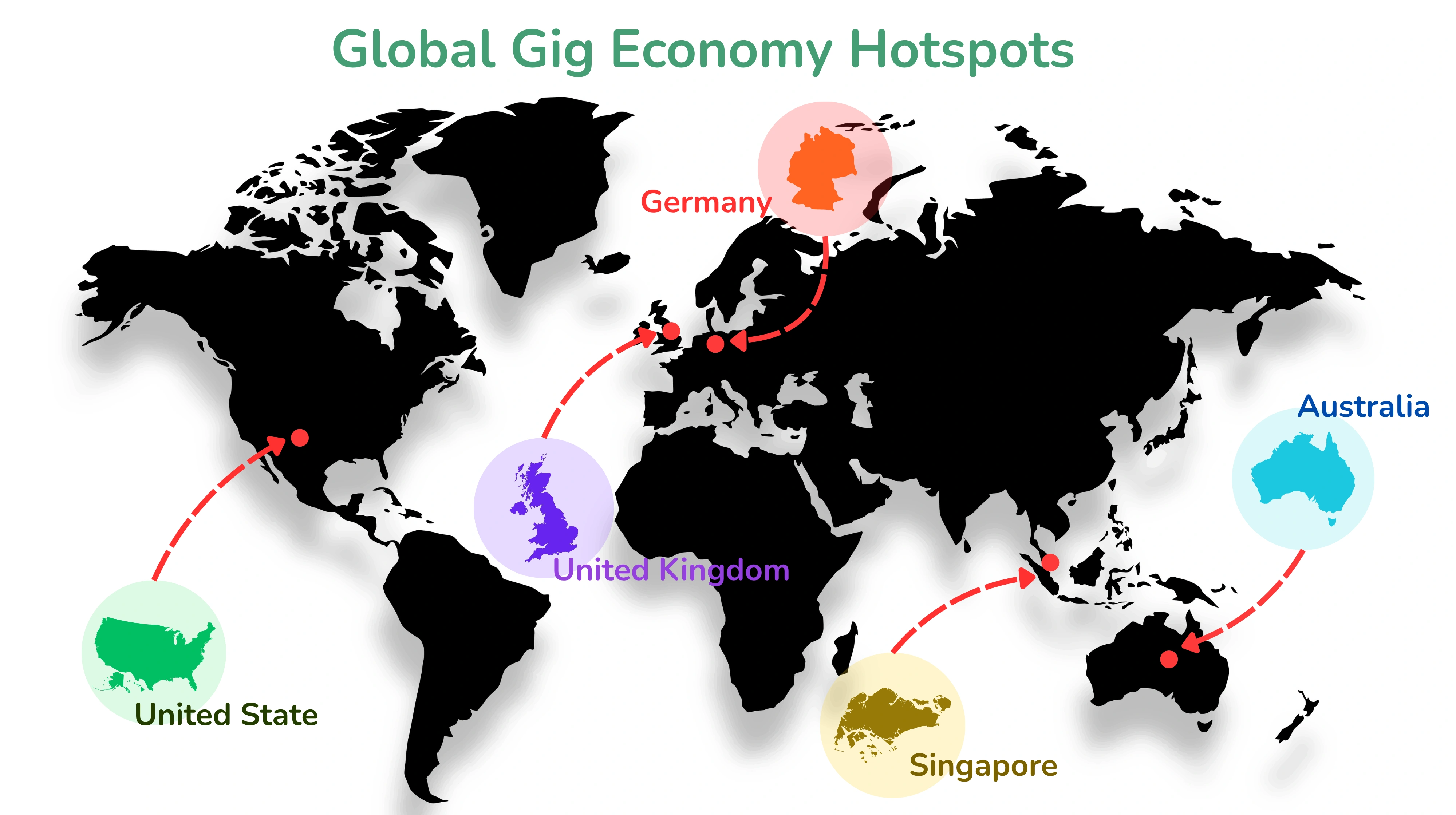Gig Economy Around the World: Lessons Canada Can Learn
- 20 Aug, 2025

Learning from the Global Gig Economy
Canada’s gig economy is rapidly growing, but there is always room for improvement. By examining international gig market trends and practices, Canada can learn essential strategies to strengthen flexibility, worker protections, and economic growth.
In this post, we explore global gig economy practices from leading countries, highlighting lessons Canada can implement for continued success in 2025 and beyond.

United States: Balancing Innovation with Regulation
Worker Classification & Protections
- California’s AB5 legislation defined clearer worker classifications, influencing nationwide policy discussions.
- Lesson for Canada: Clarify worker categories to improve protections and fairness.
Innovation and Entrepreneurship
- Strong startup ecosystems foster gig platform growth.
- Lesson for Canada: Encourage entrepreneurship and tech innovation to drive gig economy expansion.

United Kingdom: Gig Worker Rights and Fair Pay
Enhanced Worker Protections
- UK court rulings granted gig workers employee-like rights, including minimum wage and holiday pay.
- Lesson for Canada: Adopt frameworks safeguarding gig workers without hindering flexibility.
Transparent Payment Standards
- Regulations mandate clearer and fairer pay structures.
- Lesson for Canada: Ensure platforms adopt transparent payment standards benefiting workers.
Germany: Sustainability and Economic Stability
Sustainable Gig Practices
- Promotion of eco-friendly gig roles (renewable energy, sustainable businesses).
- Lesson for Canada: Leverage sustainability trends to build an eco-friendly gig economy sector.
Economic Resilience
- Strong government support and policy initiatives bolster gig economy resilience.
- Lesson for Canada: Enhance economic stability through targeted support for gig workers and startups.

Australia: Robust Platform Governance
Platform Accountability
- Strong regulatory frameworks ensure platform transparency and accountability.
- Lesson for Canada: Adopt best practices to enhance trust and reliability in gig work.
Safety & Security Standards
- Rigorous standards protect both workers and consumers.
- Lesson for Canada: Implement similar safety measures for greater workforce protection.
Singapore: Leveraging Technology for Efficiency
Advanced Digital Infrastructure
- Sophisticated digital platforms improve efficiency and gig worker connectivity.
- Lesson for Canada: Invest in advanced technology to streamline gig operations.
AI & Automation
- AI tools match gig workers with jobs accurately and swiftly.
- Lesson for Canada: Enhance AI-driven matching systems to improve opportunities and satisfaction.

Lessons Canada Should Implement
Drawing from these international examples, Canada can adopt several critical strategies:
- Enhanced Worker Protection and Fair Pay: Clearly define and protect gig workers’ rights.
- Regulatory Clarity: Implement transparent, balanced gig work regulations.
- Economic Stability Measures: Promote resilience through targeted initiatives.
- Sustainable Gig Practices: Encourage eco-friendly and sustainable gig opportunities.
- Technological Investment: Improve platform efficiency and user experience via advanced technology.
Conclusion: Canada’s Path Forward in the Global Gig Economy
By learning from international best practices, Canada can foster a gig economy that combines:
- Flexibility
- Fairness
- Innovation
- Resilience
Adopting these global lessons positions Canada as a leader in the future workforce landscape.
Stay ahead in the global gig economy - subscribe for more insights and updates!
